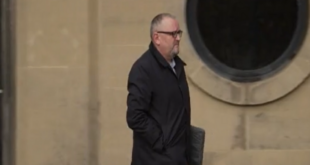This year Liverpool will be hosting Eurovision Song Contest in May after completing for the major pop culture event against a number of other UK cities.
The ongoing Russian invasion of Ukraine has meant that last year’s winners of the continental contest are unable to host the 2023 competition. As a result of coming second with Sam Ryder’s Spaceman winning over the voting public, the BBC confirmed the UK would step in to provide a host on behalf of Ukraine for Eurovision in the summer.
After a 20-city battle, with lots of public lobbying and jostling for position, music was confirmed, unlike football, to be coming home and Liverpool was named host of the competition for 2023 in October.
READ MORE: Experts urge people not to put Amazon Echo in bedrooms
The bidding process was led by Liverpool Council’s culture service, Culture Liverpool, and its director Claire McColgan. The bid was kept under wraps until Graham Norton formally announced the winner on BBC’s The One Show on October 7 last year.
Alongside Cllr Harry Doyle, Ms McColgan sat down with the ECHO, how Liverpool’s bid for the biggest music prize in Europe, began with a text message.
Cllr Doyle said: “When Sam Ryder was top of the leaderboard, I think Claire texted me actually, and said, ‘oh, my god, it could be coming to the UK, should we go for it?’ and I said absolutely. I did say as a caveat, we should wait for the public vote and then obviously the UK came second.
“When the European Broadcasting Union announced that it would be in the UK, it was from that text, really, it was like we said we were going to do it, let’s do it, then.” Of course, Liverpool wasn’t alone in hoping to bring Eurovision to the UK.
In August, a longlist was eventually whittled down to a shortlist of Birmingham, Glasgow, Leeds, Manchester, Newcastle and Sheffield. Seven became two as Liverpool was pitted against Glasgow for the honour, which pitted broadsheet columnists against the City Region’s Metro Mayor and everyone glueing themselves to a TV to find out which name Norton would pull from his envelope on BBC One.
The rest, of course, is history. Ms McColgan said: “It was incredible the amount of cities that went for it, I mean, 20 other cities. And I think that shows what a prize it is, as well.
“And it was a really complicated bid, they put us through the wringer completely. The first part of it was really, really technical and it was done in two weeks. The turnaround was just so fast.”
Usually events on the scale of Eurovision give host cities years to prepare for, but owing to this unique set of circumstances, Liverpool has just months to cram in as much preparation as possible.
That meant making sure the city was ready to put its best foot forward when judges came to town. Logic and numbers dictated that Glasgow would take the bid owing to its arena being bigger than the M&S Bank Arena on the Pier Head, but there was more to it than that, as Ms McColgan explained.
She said: “It was capacity, it was the arena size, it was where you would do the fan village, it was all about that, it was about the weight loads, hotels, weight loading on the arena, on the arena roof, and all those really, really technical things.
“And that was the first part of it. Then the second part when we were down to seven, we got more steely as we went through. It would have been awful if Liverpool hadn’t been shortlisted in the first bit, but you are up against much bigger arenas. So if it was just a financial choice, you’d be able to sell more tickets.
“I think what they loved about the M&S arena is that connection with the convention centre as well. It’s an island site so in terms of security, and in terms of all those different things, you can completely secure that site.
“Then if you look at where we’re putting the village, which is obviously on the pier head, you can separate the village by just lifting the bridge from the site as well. So it’s perfect as a site and they loved it.”
Amid the sense of jubilation on the Autumn night when Liverpool’s bid was confirmed as victorious, not everybody was as confident. Ms McColgan admitted she sent all her staff home earlier that day as she was pessimistic about the city’s chances.
Cllr Doyle however, felt differently. He said: “I felt that we’d won them. When we did the walk around with the judges, we took the BBC and the EBU on a tour of the city, and we got to the end of St. George’s Hall, and as we entered we had someone playing the organ, All You Need Is Love. All I will say is that someone within the delegation was brought to tears.”
Ms McColgan said the Liverpool bid team found out less than an hour before the general public that the city had pulled it off.
She said: “We were getting asked questions until half one in the afternoon on Friday. And I was like, why? I was thinking they’re only asking us questions so that they can say why we haven’t got it.”
After the delegation left Liverpool, the culture team were sent to BBC’s northern HQ in Salford to pitch their case and used it to answer questions that the panel had fired back.
Ms McColgan said: “I think what we didn’t do, we didn’t promise stuff that we can’t deliver. We were really honest, in our application, about the budget, really clear. So there were no anomalies in our bidding process and you’re not going to spend another six months afterwards negotiating. We’ve built a relationship I think.”
Cllr Doyle revealed he was away at the time of the announcement but was “constantly on the phone to Claire. We were calling, messaging all the time.”
He added: “I told her to just message me and put Y or N and in the end, I ended up messaging someone else and the Y came through.”
It would be easy to be immediately overwhelmed by the scale and the challenge that hosting a continental song contest brings, but that doesn’t seem to be the case for Ms McColgan and her team at the Cunard Building. She said: “It’s a brilliant thing and it’s a major event.
“We’ve done harder events, if I’m honest. This isn’t the hardest event we’ve ever done. Giants was harder.
“I mean, logistically harder, much harder, complex, complicated, shutting the whole city down really complex. We’ve never done anything that’s such a high profile, I don’t think, and that’s the difference.”
The city council is putting in a financial contribution, capped at £2m, as well as the Liverpool City Region Combined Authority. Metro Mayor Steve Rotheram said Eurovision could have the same impact for Liverpool as the European Capital of Culture status 14 years ago, something Cllr Doyle agreed with.
He said: “Capital of Culture for the city was obviously huge. In the run up to 2008, during 2008, and the legacy that Claire and the team has been building for years and years and years. For our generation, this is that moment.”
Ms McColgan added: “There are over 1,000 media, you know, there’s huge amounts of influencers. It’s massive.
“It responds really well to things like this. I don’t think it’d be like that in any other place. So if you’ve got it in Manchester or even in places like Glasgow, Leeds, it would have kind of got people to get over it by the next day.
“The fact was people here were in pubs jumping up and down when they announced it on the One Show and when I left here, the bells were ringing, they’d rang all the bells in the city.”
Ms McColgan said the team had to prepare “for the worst in some ways, but I was really proud whatever happened” and said winning the race to host the international music extravaganza would deliver a long term economic impact that would be “absolutely huge.” She said the city is having “really good conversations” with external partners on how to sell “the UK and Liverpool across the world.”
She said: “Nobody’s not going to have not heard of Liverpool in the next six months.”
Cabinet member Cllr Doyle acknowledged the difficulties the council has faced in the last 22 months but said Eurovision “genuinely feels like a turning point. And, you know, people are looking forward to this.
“Now people are now starting to turn their heads and see Liverpool actually, as a global superpower, it is a great place to invest. So just from the announcement, things are already starting to shape for the city.”
Ms McColgan, who has worked for Liverpool Council for more than two decades and been recognised with an MBE and CBE for her work, said while difficulties have been around the council for some time, Eurovision and the wider cultural offer the city has would give people “brilliant things to be proud of.”
She said: “You can’t have a city that is always known for whatever we’re known for at the moment, commissioners, all that sort of bad stuff that’s happening in Liverpool.
“People genuinely in Liverpool just want a city to be bloody great. That’s what they want.”
READ NEXT:
Son, 21, shot dead as he got Christmas presents out of his car
Addison’s disease symptoms as Liverpool coach Jay Spearing’s body ‘shuts down’
Third person arrested over murder of Elle Edwards as two remain in custody
Encro hack hits heavy drug gangs rooted in Croxteth, Huyton and West Derby
Talented teenager bounced back from drink, drugs, tragedy and abuse


